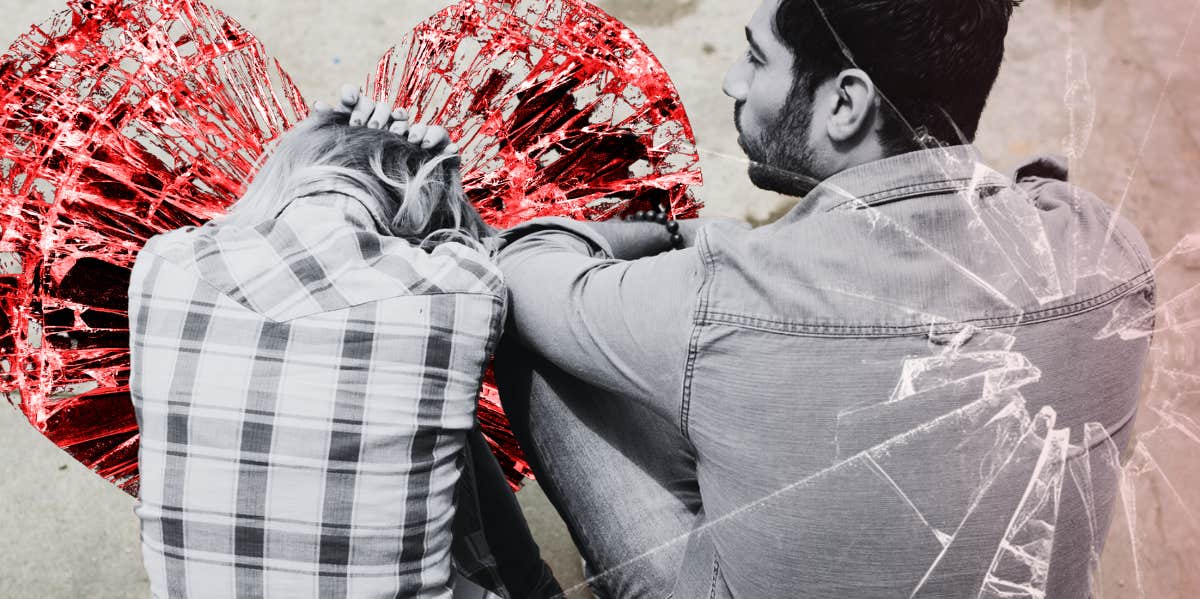After 20 Years Working In Behavioral Therapy, Here Are 10 Ways To Notice An Abuser
Why do some people become conditioned to accept abuse?
 zimmytws | Getty Images / Odonata Wellnesscenter | Pexels
zimmytws | Getty Images / Odonata Wellnesscenter | Pexels Abuse can insidiously sneak its way into relationships. Often, you feel blindsided by the signs of abuse.
You don’t know what happened. How did you get here? Without warning, suddenly your world is reeling, uncontrollably.
How do you catch the signs of abuse before it's too late? First, you have to know why it happens.
Dina L. McMillan has a Ph.D. in Social Psychology from Stanford University and has counseled many female victims and male perpetrators of domestic violence.
She provides training for human service professionals, advises the government on domestic violence policy, and assists agencies in developing domestic violence support programs.
She explains in her book But He Says He Loves Me how to tell if a man (speaking of the majority here — women can be domestic violators, too) is an abuser and an emotional manipulator.
McMillan says, "When our brains are hooked we have only one option — one protection — one defense that is to get away from them. Your brain adapts to this process quickly and you are unaware of it."
There are reasons why you might not notice that your partner is an abuser and why you're still hooked on them.
RELATED: 11 Horrifying Myths And Facts About Domestic Violence
Your brain gets conditioned to not have boundaries, tolerate inappropriate behavior, or stay in relationships. You are set up to be a prime candidate from the beginning.
McMillan says, "The abuser starts right from the beginning, grooming, and testing to see if you are a good fit for them. Showing way too much too soon. They will overpower you with affection, attention, adoration, and even gifts or grandiose promises or gestures. You will be his girlfriend quickly."
You’ll soon be spinning and unable to concentrate or think clearly. The chemistry will be so strong, you’ll feel happy and full of life.
Your brain will be hooked, chemically, but you don’t know what's happening.
It was important to hear and take in that this happens subconsciously and at a level that's much deeper than conscious thought. Our brains get hijacked.
McMillan says, "The abuser will direct their attention to your emotions to divert the other actions and will want to underestimate the impact. You are so overtaken by him you’ll want to overlook it, too."
Here are 10 ways to notice an abuser:
1. They share secrets too soon
They want you to share your secrets and be vulnerable.
2. They come on strong, and fast
Everything is too much, too soon.
3. You suddenly feel you've known them forever — but you haven't
You’ll quickly feel you’ve known them for a long time.
4. They wear you down.
Your fatigue will make you easier to influence.
5. They promise the world
They make too many promises.
6. They are quickly future-focused
They talk too much talk about the future.
7. They make big plans
They keep making big plans.
8. They treat you as "exclusive"
They swear they're doing things for you that they've never done before.
9. You feel you can't say no
You find you don’t want to say "no" to them because you don’t want to hurt their feelings.
10. You pity them, giving them endless chances
If they do something hurtful, you end up saying to yourself, "Poor them, they deserve another chance."
Abusers will do everything in their power to stay in your life.
Remember, if you reject them, they will do everything in their power to stay in your life.
They will ignore your requests and continue to contact you, text you, and show up to where you are.
You can avoid them if you keep in mind that their primary aim is to have control. They want to have you in their life one way or another.
Self-forgiveness is part of healing from domestic abuse.
My journey continues in my curiosity about how our brain affects our relationships and my journey to understanding myself.
What I gained from this information was that my brain couldn’t resist the situation. I needed to not only take responsibility for my part but also hug myself and forgive myself.
I couldn’t have done it differently because I didn’t know the difference.
Self-forgiveness is powerful in our relationship with ourselves. It's the most important aspect.
If you’re experiencing domestic abuse, you’re not alone. The National Domestic Violence Hotline reports that approximately 24 people per minute are victims of rape, physical violence, or stalking by an intimate partner in the U.S. More than 12 million women and men over the years have suffered from instances of domestic violence and abuse.
If you’re experiencing domestic abuse, you’re not alone.
The National Domestic Violence Hotline reports that approximately 24 people per minute are victims of rape, physical violence, or stalking by an intimate partner in the U.S. More than 12 million women and men over the years have suffered from instances of domestic violence and abuse.
If you or someone you know is suffering from domestic abuse or violence, there are resources to get help.
There are ways to go about asking for help as safely as possible. For more information, resources, legal advice, and relevant links visit the National Domestic Violence Hotline. For anyone struggling with domestic abuse, call the National Domestic Violence Hotline at 1-800-799-SAFE (7233). If you’re unable to speak safely, text LOVEIS to 1-866-331-9474.
Lisa Hawkins is a certified life coach, certified cognitive-behavioral therapy coach, and a dating and relationship coach. She has 26 years of experience in personal growth and development, psychology, and human behavior with an emphasis on relationships.

